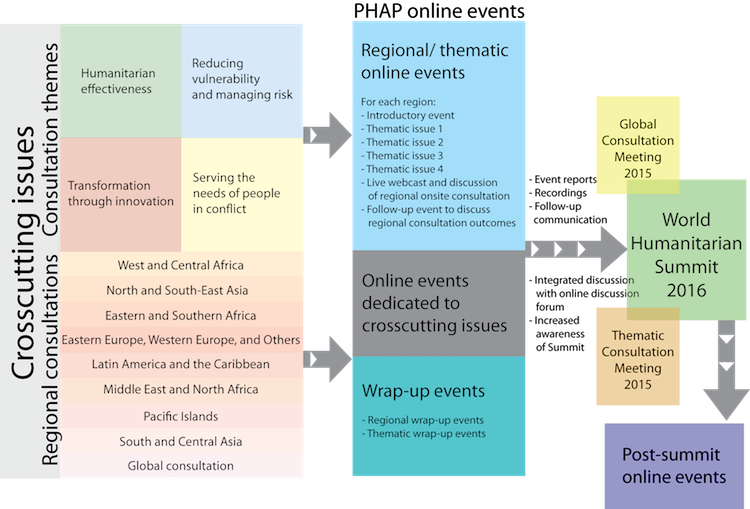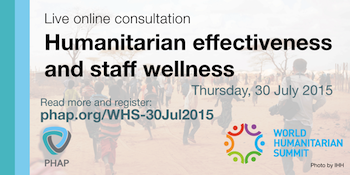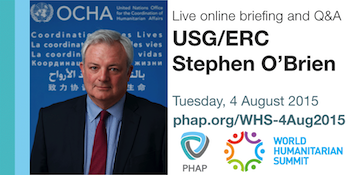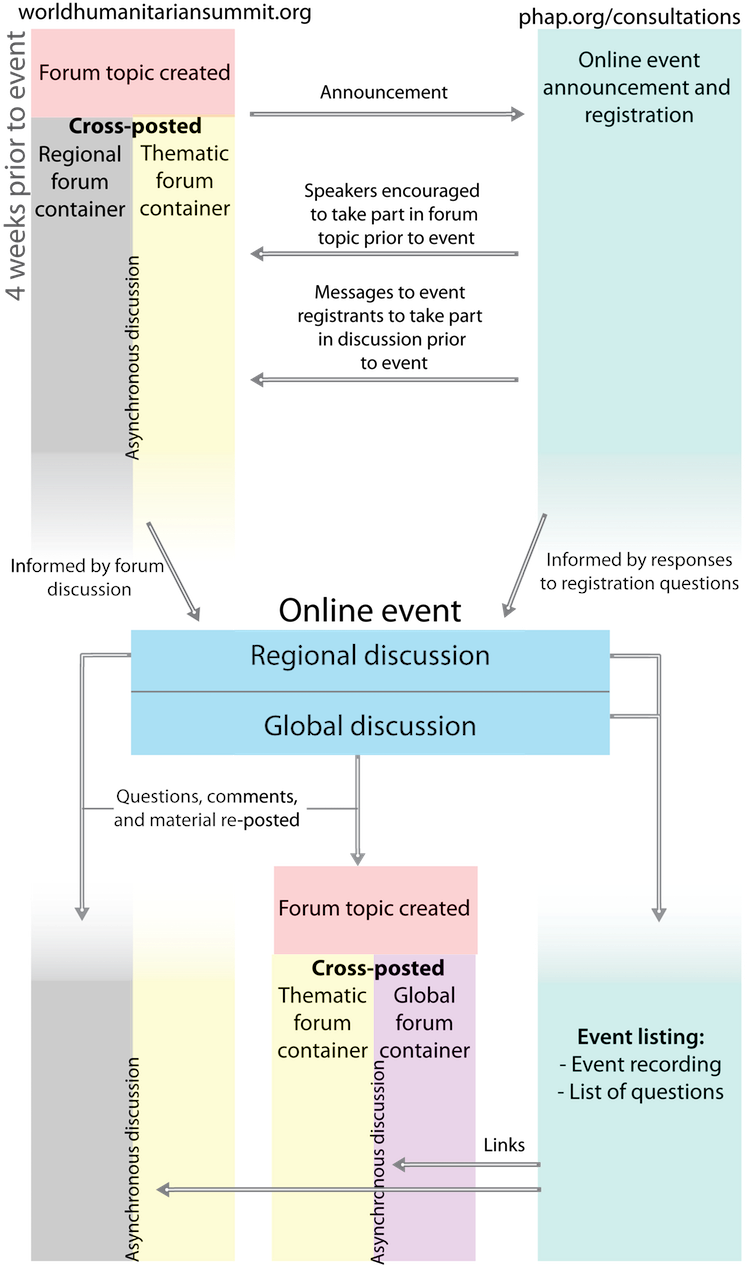Consultations through live online events
- Website
- https://phap.org
Success Achieved
How PHAP engaged 14000 humanitarian workers around the world.
Introduction
The World Humanitarian Summit is a sector-wide initiative aiming to transform how humanitarian assistance is delivered. It was crucial that PHAP, as the only individual-based professional association bringing together all parts of the humanitarian sector, engage its members and the wider humanitarian community in this process in order to make sure that the perspectives of
a wide variety of humanitarian workers are taken into account for the Summit.
In order to reach this diverse group of professionals – both in terms of geography and professional specializations – PHAP embarked on organizing a long series of live and interactive online consultation events.
Discovery
The World Humanitarian Summit, to be organized in Istanbul in May 2016 by the United Nations, is the first ever event of this scale and has been preceded by a major consultation initiative that has aimed to gather the views and ideas of all actors and stakeholders involved in humanitarian action to better understand existing concerns and build legitimacy for proposals to be discussed at the Summit.
To meet the high-set ambitions, it was clear early on that the consultation process needed to be carried out through a variety of channels and be promoted actively to the more hard-to-reach members of the sector in order to ensure a global reach with enough participants to build legitimacy for the process and maintain momentum throughout the entire consultation period.
PHAP decided to work together with the Summit secretariat to organize a stream of live online consultation events in order to give members of the association an effective means to provide their views, experience, and expertise to this important moment shaping how humanitarian action is carried out.
Objectives
- Vastly improve the possibilities of promoting the consultation process and continually renew interest and engagement in the process;
- Improve the quality of online discussions by enabling real-time interaction;
- Help sharpen focus of thematic and regional discussions by limiting interaction in time;
- Improve outreach to stakeholders that are otherwise difficult to reach due to geographical location or time constraints;
- Improve outreach to stakeholders that do not have time and/ or interest in engaging in asynchronous written online discussions;
- Help build legitimacy for the Summit process and outcomes through improved inclusiveness and responsiveness in real time.
The target was ambitious – to reach 1000 professionals in the humanitarian sector through the live consultation events.
Project period
May 2014 – May 2016
Project Team
- Angharad Laing, Executive Director
- Markus Forsberg, Membership and Communications Coordinator
- Suranjana Das, Database Assistant, Interns and trainees
- Marc DuBois, independent consultant, former Director of MSF-UK
Project Partners
- International Organization for Migration (IOM) - contributed financially and with their expertise to the organization of two events: Trafficking in Persons in Times of Crisis and Migrants in Crisis.
- Norwegian Refugee Council (NRC) - contributed financially to the organization of Realities of being principled in today’s field operations as well as with their expertise on principled humanitarian action for other events.
- The WHS Secretariat, Regional Steering Committees, and Thematic Teams - were directly involved in various ways in the organization of all of the consultation events. Through them various UN agencies, offices, and programs have been involved, including UNHCR, OCHA, UNFPA, UNDPKO, UN Women, and the UN Major Group for Children and Youth.
- The International Committee of the Red Cross (ICRC) - was engaged in the planning of three of the events on humanitarian principles, as well as those on humanitarian innovation and the humanitarian use of UAVs.
- The International Federation of Red Cross and Red Crescent Societies (IFRC) - were heavily involved in the regional consultation processes and contributed to the online consultation events for Latin America and the Caribbean and for the Pacific region.
- World Vision International (WVI) - contributed to both the Latin America and Caribbean consultation event and the events on the role of faith-based organizations as well as the event on impartiality.
- Oxfam - took part in organizing the events relating to the principle of neutrality.
- The Harvard Program on International Law in Armed Conflict (PILAC) - provided their legal expertise in planning for the events on principles.
- The Humanitarian Innovation Project (HIP), the Humanitarian Innovation Fund (HIF), and Villgro Innovation - all collaborated on the organization of the event on humanitarian innovation.
- UAViators, Medair, and the American Red Cross - contributed to the planning and implementation of the event on humanitarian UAVs.
- Start Network, HERE Geneva, the Kenyan Red Cross, the Syrian NGO Alliance, Handicap International - involved in the organization of the series of consultation events on dilemmas related to the humanitarian principles.
- Order of Malta and their organization of a related consultation event in Geneva - closely coordinated the event on the role of faith-based organizations
- Caritas Internationalis and the NGO Committee on Migration, together with IOM - involved in the organization of the two consultation events on trafficking and migration.
- Hayata Destek - supported the organization of the regional consultation event for South Asia.
- The Antares Foundation - provided their expertise for the organization of the event on effectiveness and staff wellness.
Activities
PHAP’s strategy
- Accessibility – provide several connection options
- Engagement, interaction, and discussion with all participants through a variety of means – before, during, and after event
- Weaving together panel discussion with input from full range of participants through expert facilitation
- Mix of thought leaders and practitioners
- Targeted, yet open for free thinking
- Reports to tie all of the different strands together
- Multiple ways to leave feedback, continuously improving format
More than 30 live online consultation events organized in English, French, and Spanish, on various world regions and specific topics related to humanitarian action. These have resulted in consultation reports based on the discussion of each of the events that have helped inform the recommendations for the Summit that is to take place in May 2016.

Activities chart
The 17 events organized in 2015 included:
Regional consultations
The regional consultation events tied in with the onsite events organized by the WHS Secretariat and the Regional Steering Committees. Each online consultation event was organized in the weeks leading up to the main onsite regional event and served to help identify the topics of greatest concern to the humanitarian community in the region; gather input from participants on issues identified by the Regional Steering Committee; and inform about and build interest in the onsite consultation event. Three regional consultation events were carried out in this period.
9 April 2015: Desplazamientos y Violencia en Latinoamérica y el Caribe
This event, organized in Spanish with live captioning in English, focused on the displacement-violence nexus in Latin America and the Caribbean. The consultation brought together representatives from UN agencies, international NGOs, and the Red Cross – all working on displacement in the region, to clarify the problems at hand for the region and how to move forward.
2 June 2015: Pacific Regional Consultation
Organized a month ahead of the consultation event in Auckland, New Zealand, for the Pacific region in Auckland, one of the most disaster prone regions in the world, the event focused on issues such as the humanitarian- development divide in the region, local ownership and capacity building, and the role of the military and the private sector in disaster response.
14 July 2015: Localizing Preparedness and Response in South and Central Asia
Focusing on the localization of humanitarian preparedness and response, identified as an area of particular concern for the region, this event aimed to clarify what localization should mean in practice for different actors involved in the response to natural disasters, protracted crises, and armed conflicts in South and Central Asia.
Thematic consultations
The thematic consultation events tied in with the original four thematic areas of the WHS, as well as the cross- cutting themes identified earlier in the consultation process. The thematic events were organized in two parts, with each event starting with an expert briefing in order to clarify the key terms and concepts relating to the topic discussed and ensure a shared understanding among panelists and participants in the ensuing discussion on priorities and ideas for meeting the challenges relating to the topic.
4 June 2015: Faith and Religion in Humanitarian Action – Improving Cooperation and Effectiveness
Building on the symposium organized by the Order of Malta, this event focused on the challenges and opportunities faced by faith-based humanitarian organizations and how we can overcome the obstacles hindering faith-based and other organizations from working more closely together.
18 June 2015: Trafficking in Persons in Times of Crisis
Organized in collaboration with the International Organization for Migration (IOM) and Caritas Internationalis and building on an event during the Human Rights Council in Geneva earlier the same month, the event focused counter-trafficking strategies and activities for humanitarian crisis situations.
29 June 2015: Migrants in crisis
Organized in collaboration with IOM and the NGO Committee on Migration, this event looked at the need to include migrants within the humanitarian agenda and to develop systematic ways for governments, intergovernmental organizations, and civil society to be able to deal with migrants in crisis situations.
8 July 2015: Principles for Ethical Humanitarian Innovation
This event took the recently drafted Principles for Ethical Humanitarian Innovation as a starting point for gathering further input from both panelists and event participants on both their formulation as well as their operational relevance.

Event website ad
30 July 2015: Humanitarian Effectiveness and Staff Wellness
Bringing together close to 200 participants, this event focused on the links between staff wellness, safety and security, and humanitarian effectiveness.
6 August 2015: Gender-Based Violence in Humanitarian Crises
Organized on the crosscutting theme of gender, this event was an opportunity to take stock of what has been done to date, to highlight good practices, and to help clarify the recommendations that should be submitted to the World Humanitarian Summit.
September to October 2015: Series on Dilemmas of Principled Humanitarian Action
This series started with an advanced briefing on the four core principles followed by four briefings and consultations focusing in on dilemmas related to each of the principles. These events helped put many of the challenges that had come up in the discussion in previous consultation events in a framework that all humanitarian practitioners can relate to – that of principled humanitarian action. At the same time, the events helped clarify what following humanitarian principles means in practical situations. In order to tie together the discussions in this event series, an event was organized with NRC, based on their recent research on principles in practice.
16 September 2015: Humanitarian UAV Code of Conduct & Guidelines
Focusing on the recently drafted Humanitarian UAV Code of Conduct & Guidelines, this event discussed how UAV technology can be used in a safe, coordinated, and effective manner in humanitarian crises.
Process Briefing
The online events reach a different and wider audience than onsite events. This makes them a good vehicle for informing about the overall consultation process and its relationship to the Summit itself.
4 August 2015: Live Online Briefing and Q&A with USG ERC Stephen O’Brien

PHAP organized an event with the new Emergency Relief Coordinator, Stephen O’Brien, in which he provided his perspectives on the World Humanitarian Summit and briefed participants on the recent regional consultations, the overall outcomes of the consultation process, and the road leading up to the Istanbul event.
These events involved a wide range of partners in their organization, and – with around 14 000 participations and views of the events – engaged a large percentage of the people participating in the World Humanitarian Summit consultations as a whole.
This was organized using roughly one FTE. This was primarily achieved by standardizing event organization and reporting processes.
Challenges
The ultimate goal is meaningful and lasting change to the way that humanitarian assistance is delivered in order for it to meet the drastically increasing needs the world is seeing in conflicts and natural disasters around the world as well as address underlying issues.
As this requires the commitment of states on a number of challenging issues, including improving how international laws and norms are followed and how government donors fund humanitarian action, it is easy for actors in the sector to get disillusioned and disengage for processes such as this.
The consultation events organized by PHAP has helped to build and sustain engagement and build a more constructive approach to the issues at hand leading up to Istanbul.
Achievements
PHAP organized in total more than 30 live online consultation events in English, French, and Spanish in support of the World Humanitarian Summit. The reach of, and engagement in, the events greatly exceeded the targets with around 14,000 participations and views of the events.
The live online consultation events organized by PHAP engaged a large percentage of the people participating in the World Humanitarian Summit consultations as a whole, illustrating the considerable force for improvement that a professional association can bring to the humanitarian sector. With more than 9,000 individual points of engagement in the events just in 2015 and more than 2,000 interactions via social media, these online consultation events managed to inspire
the confidence and commitment of the humanitarian practitioners that took part, many of whom would otherwise be unlikely to provide their input to the process.
Participant demographics – live online consultations
Participants were based in 156 different countries. The events managed to reach regions with in general lower Internet connectivity, with a clear majority citizens of countries in Africa, Asia, MENA, South America, and the Pacific. The events also attracted a wide spread of participants in terms of their professional experience, with a majority having more than 11 years of experience. All different kinds of actors involved in humanitarian actors took part in the events, with local and international NGOs particularly well represented.
Moreover, the organization of the live online consultation events helped considerably increase the visibility of the World Humanitarian Summit process as a whole. The event info pages had more than 80,000 page views by close to 15,000 people. Additionally, the social media posts across Facebook, LinkedIn, and Twitter gained 300,000 impressions.
In addition to strengthening the consultations in their own right, live engagement of participants through online events gives practitioners a stronger feeling of being part of a substantive process and of being heard. This, combined with tailored pre- and post-event communication to enhance the quality and quantity of inputs to the consultations, builds a sense of ownership of the process and greater likelihood of broad-based buy-in to the Summit outcomes.
Moreover, with a growing interest among humanitarian organizations in engaging in the Summit process, the online events provided a concrete – yet flexible – structure through which to engage partners and ensure that there was organizational buy-in into the Summit.
Lessons learned and adjustments
- Improve format of event - Combining learning sessions with consultation events in order to ensure a shared understanding of key concepts discussed, and attract a different audience than pure consultation events.
- Improve accessibility of live events – live streaming
- Improve accessibility of event recordings – YouTube recordings and audio podcasts
- Improve framing and continuity – organization of series of events on dilemmas related to principled humanitarian action that could deal with many otherwise disparate issues
Targets & Statistics
- 7,056 participants in live events and viewers of recorded videos:
- 3,062 live participants
- 2,388 Adobe Connect recording views
- 2,056 YouTube recoerding views
- 9,089 interactions in the live events:
- 459 pre-event questions and comments
- 4,134 ive questions submitted and live chat messages
- 1,011 free text live poll responses
- 4,205 multiple choice live poll responses
- 53,402 event info page views
- 10,973 users viewing the event info page
- 169,159 social media impressions related to the events:
- 15,811 via Facebook
- 30,940 via Linkedin
- 121,660 via Twitter
- 748 via Google+
- 2,049 social media interactions related to the events:
- 451 via Facebook
- 167 via Linkedin
- 1,422 via Twitter
- 9 via Google+
What would we do differently?
- Systematically collect data from the start on live engagement in the events to be able to identify champions to draw on for the promotion and organization of later events.
- Better integrate with platforms for asynchronous online discussion
- Have a brief introductory training for speakers prepared – being an engaging speaker in an online event often requires coaching
- On the wishlist: Better integration between online event platform and CRM in order to be able to capture certain data without having to manually process and import it.

Live-asynchronous link
Feedback & Testimonials
“The content was fantastic, I was really inspired by the number of people involved and the engaged discussion by all members. Thank you for sharing your expertise and your time.”
Participant, Consultation on humanitarian effectiveness and staff wellness
“Great online consultations and really good signposting and follow-up afterwards which is helpful, it’s a very impressive setup and I am very much enjoying participating and learning more.”
Participant, Briefing by the Emergency Relief Coordinator
“These forums are excellent opportunities to keep the humanitarian community engaged, connected and up to date. Keep doing them!”
Participant, Consultation on gender-based violence in humanitarian crises
“I appreciated the quality of the meeting presentation in general, but especially the broad expertise. This work is necessary to build sustainable people which will build sustainable communities.”
Participant, Consultation on the principle of humanity
“So timely and worth sharing to our organization and network members. So enlightening and helpful to us as we review our own situation. Great Job PHAP organizers and of course the speakers. Thank you very much, this is a big help to us humanitarian workers.”
Participant, Consultation on the principle of impartiality

